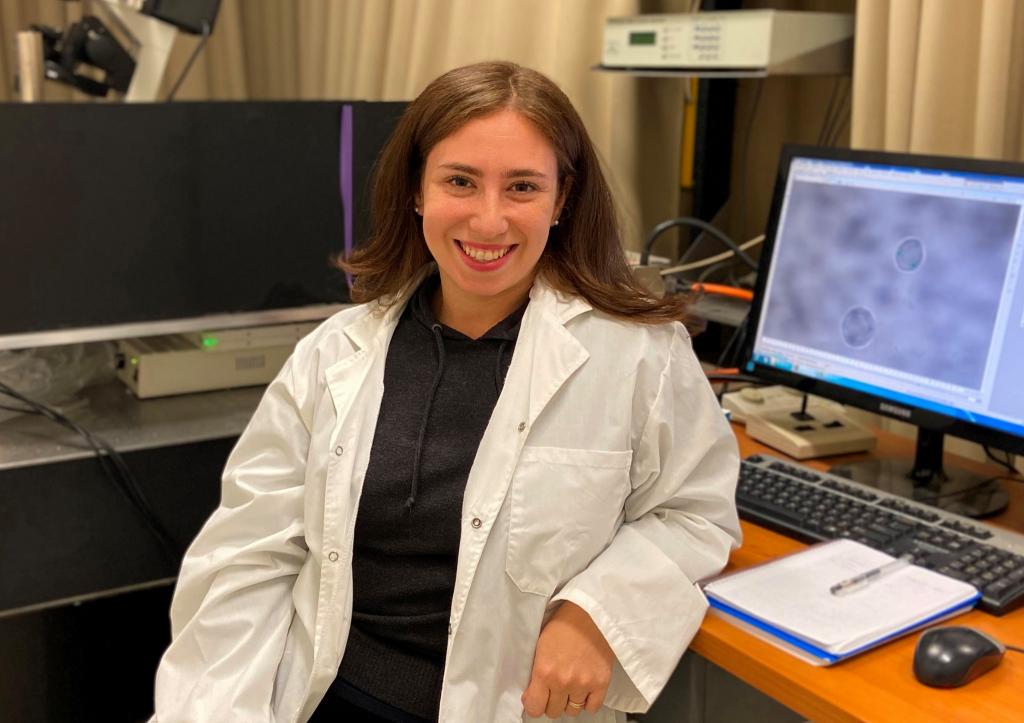Shir Hochold-Lieber - Exposing the mysteries of the human microbiom

Dr. Shir Hochold-Lieber develops a biochip for diagnosing, sensing, and treating the human microbiome. Her work awarded her a postdoctoral scholarship by the Israel Academy of Science.
Last month, Dr. Hochold-Lieber learned of her winning the coveted Israel Academy of Science scholarship. "COVID caught me just after finishing my PhD thesis, when I was exploring my options for a postdoctoral position abroad. The pandemic ended up closing off every border, and the idea was scratched," she recalls. "Gladly, the academy was offering an emergency scholarship for people in my very situation, who can't pursue a post-doctoral project abroad. Only ten postdoctoral students received it, and I was one of them."
Hochold-Lieber, 31, married+2, spends her days at Prof. Rachela Popovtzer’s lab. A physicist by training, she studied physics at Bar Ilan, at Prof Eli Sloutskin’s lab. "I was nearing the end of my PhD studies and thinking about going abroad, I wanted to expand my skills to other scientific fields I hadn't experienced yet," she says.
"I heard a lot about Rachela, and her fields of research seemed fascinating. She suggested a project that sounded really exciting, in collaboration with Prof. Alex Fish's lab. Together, after strenuous searching, we've come to the project we're working on now, and it's truly unique and incredible."
As part of her research, Hochwald-Lieber is developing a biochip for diagnosing, sensing, and treating the human microbiome in real-time, and finding a technological solution to the problem of antibiotic-resistant bacteria. "Our body is made up of many cells, and even more bacteria and other tiny creatures that live in our body, particularly in the colon," she explains. “That’s the microbiome, our bacterial makeup, and it has a great impact on our health, far beyond the state of the colon or our metabolism: many studies show that the microbiome also affects emotions, depression or eating disorders.”
“At this point,” says Hochwald-Lieber, “we don’t know enough about the microbiome, and can’t determine the bacterial makeup that affects certain states. Our chip will allow us to know more, using breakthrough treatment based on the human microbiome. It would be able, for example, to diagnose bacterial population in the colon, identify its activities, and treat it in real-time. It would also allow us to better hone the bacterial makeup and attribute it to a specific state. This will further the research of future treatment using the microbiome.”
Naturally, the new chip is destined to be of great help in diagnosing various infections and inflammations of the colon and solve the problem of bacterial resistance to antibiotics. “When antibiotic treatment doesn’t work, the next step is often fecal microbiota transplantation – which provides a sick colon with the bacterial environment of a healthy person. We’re offering a different solution, one that would let us see what happens inside the colon in real-time, and propose suitable treatment,” says Hochwald-Lieber. “The ability to diagnose the microbiome with greater accuracy could replace antibiotics and solve the problem of resistant bacteria.
Last Updated Date : 08/10/2020



